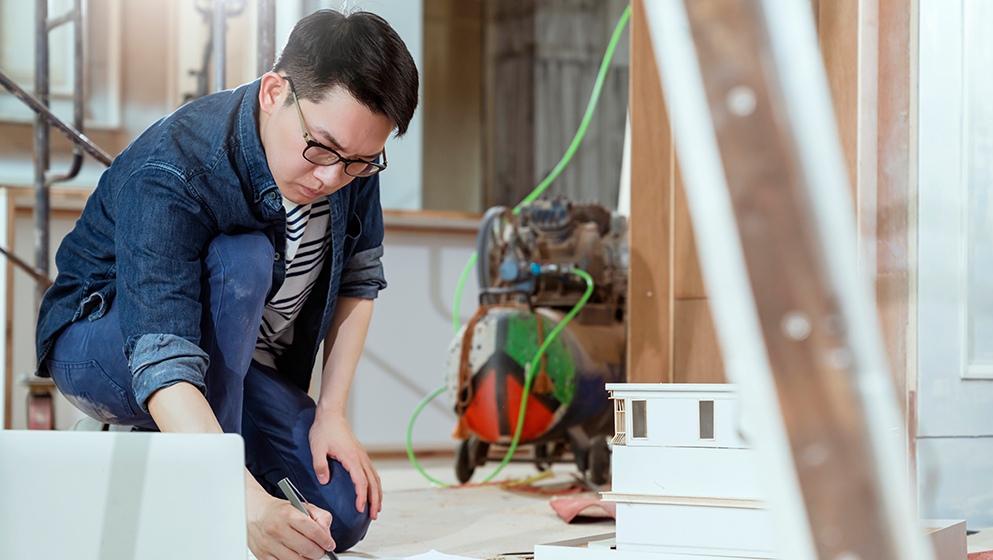The process of purchasing a home is a significant investment that requires careful consideration and evaluation. One crucial step in this process is involving a home inspector before finalizing the purchase. A home inspection serves as a comprehensive examination of the property’s condition, providing valuable insights into its structural integrity, safety, and potential issues. By engaging a reliable home inspector, potential buyers can ensure that they make an informed decision based on accurate and objective information. This article aims to highlight the importance of involving a home inspector before buying a property, discussing the process of finding a trustworthy home inspector, understanding what to expect during an inspection, and interpreting the inspection report. Additionally, it will provide guidance on taking appropriate actions following the inspection. By following these guidelines, potential buyers can safeguard their investment, ensuring the purchase of a safe and secure home.
Importance of a Home Inspection
The significance of a home inspection cannot be overstated as it serves as a critical step in ensuring a safe investment by thoroughly evaluating the condition of the property. A home inspection is a comprehensive examination of the structural integrity, safety features, and overall condition of a house. It provides potential buyers with valuable information about any existing or potential issues, allowing them to make informed decisions before finalizing the purchase.
One of the key benefits of a home inspection is that it helps identify any hidden problems that may not be apparent during a casual walk-through. Trained home inspectors have the expertise to identify structural weaknesses, electrical and plumbing issues, as well as potential safety hazards such as mold or asbestos. By uncovering these issues, buyers can negotiate repairs or request a reduction in the purchase price, ensuring cost-effectiveness in the long run.
Moreover, a home inspection also provides buyers with peace of mind. Knowing the exact condition of the property can prevent unpleasant surprises and unexpected expenses down the line. Buyers can have confidence in their investment and avoid potential financial burdens that may arise from purchasing a property with hidden defects.
To ensure a safe investment, finding a reliable home inspector is essential. Their experience and knowledge play a crucial role in accurately assessing the property’s condition. By cooperating with a reputable home inspector, buyers can gain a thorough understanding of the property’s strengths and weaknesses, allowing them to make an informed decision about their investment.
In conclusion, a home inspection offers numerous benefits, including cost-effectiveness and peace of mind. It allows potential buyers to identify hidden problems, negotiate repairs, and make informed decisions about their investment. Finding a reliable home inspector is the next important step in this process.
Finding a Reliable Home Inspector
When searching for a reliable home inspector, it is important to ask for recommendations from trusted sources such as friends, family, or real estate professionals. This can provide valuable insights into the inspector’s reputation and reliability. Additionally, it is crucial to research the credentials and experience of potential inspectors to ensure they have the necessary qualifications and expertise. Lastly, scheduling a comprehensive inspection is essential to thoroughly evaluate the condition of the property and identify any potential issues or concerns.
Ask for Recommendations
Requesting suggestions from trusted sources can help guide you in finding a reliable home inspector. It is important to gather recommendations from individuals who have recently purchased homes and have had positive experiences with their home inspectors. Additionally, reaching out to real estate agents, friends, family members, or colleagues who have gone through the home buying process can provide valuable insights. By asking for recommendations, you can gain information about the home inspector’s professionalism, reliability, and knowledge. It is also beneficial to inquire about home inspector fees to ensure that they align with your budget. Furthermore, trusted recommendations can help you avoid common home inspection issues and ensure that the inspector will thoroughly assess the property. Once you have gathered recommendations, the next step involves researching the credentials and experience of the suggested home inspectors.
Research Credentials and Experience
Conducting a thorough investigation into the qualifications and experience of potential home inspectors is crucial for ensuring a reliable and comprehensive assessment of the property. When researching home inspectors, it is important to consider their qualifications and credentials. Look for inspectors who are certified by reputable organizations, such as the American Society of Home Inspectors (ASHI) or the International Association of Certified Home Inspectors (InterNACHI). These certifications demonstrate that the inspector has met certain standards and possesses the necessary knowledge and skills to perform a thorough inspection. Additionally, consider the inspector’s experience in the field. An experienced inspector is more likely to have encountered a wide range of issues and can provide valuable insights into the condition of the property. By thoroughly researching the qualifications and experience of potential home inspectors, buyers can ensure a reliable and comprehensive assessment of the property. This research will lay the groundwork for the subsequent step of scheduling a comprehensive inspection.
Schedule a Comprehensive Inspection
Scheduling a comprehensive inspection is a critical step in the process of ensuring a reliable and thorough assessment of the property’s condition. By hiring a professional home inspector, potential buyers can gain valuable insights into the true state of the property. One of the key benefits of a pre-purchase inspection is the ability to identify any hidden issues or potential problems that may not be visible to the untrained eye. This can save buyers from unexpected expenses and help them make an informed decision about the property’s value. Although home inspector fees vary depending on factors such as location and property size, the cost is typically a small price to pay considering the potential savings and peace of mind it can provide. Moving forward, it is important to understand what to expect during a home inspection to be fully prepared for the process.
What to Expect During a Home Inspection
One important aspect of a home inspection is understanding what to expect during the process. A home inspection is a comprehensive examination of a property’s condition, typically conducted by a professional home inspector. It is crucial for potential home buyers to be aware of the common issues that may arise and the potential repairs that might be needed. During the inspection, the home inspector will thoroughly assess the property, examining its structural components, electrical systems, plumbing, HVAC systems, and more.
The inspection process usually begins with a visual examination of the exterior of the property, including the roof, gutters, and siding. The inspector will then move indoors, inspecting each room, checking for any signs of damage, such as cracks or leaks. They will also examine the electrical systems, ensuring that they meet safety standards, and test the plumbing fixtures for leaks or malfunctions.
Throughout the inspection, the home inspector will document any findings, taking notes and photographs to include in the final inspection report. This report will provide a detailed overview of the property’s condition, highlighting any issues that were identified during the inspection. It is essential for potential buyers to thoroughly review the report and understand its implications before making a final decision.
In conclusion, a home inspection is a crucial step in the home-buying process. Understanding what to expect during the inspection can help buyers make informed decisions about potential repairs and negotiate with sellers if necessary. The next section will delve into the importance of understanding the inspection report and how it can further inform buyers about the property’s condition.
Understanding the Inspection Report
The inspection report serves as a comprehensive documentation of the property’s condition, presenting a detailed overview of any issues identified during the inspection process. It is a crucial document that allows buyers to understand the true state of the property they are considering purchasing. The report typically includes information about the structural integrity of the home, the condition of the plumbing and electrical systems, the presence of any pests or mold, and the overall functionality of various components such as doors, windows, and appliances.
Interpreting the findings within the inspection report requires some knowledge and understanding. The report will often use technical terminology and may include photographs or diagrams to provide visual evidence of the identified issues. It is important for buyers to carefully review the report and seek clarification from the home inspector if needed. By fully understanding the findings, buyers can make informed decisions about the potential costs and risks associated with the property.
Furthermore, the inspection report can also be used as a negotiating tool. If significant issues are identified during the inspection, buyers may choose to negotiate repairs or ask for a reduction in the purchase price to account for the necessary repairs. In some cases, buyers may even decide to walk away from the purchase if the inspection report reveals major problems that they are not willing or able to address.
In conclusion, the inspection report is a crucial document that provides a detailed overview of the property’s condition. By interpreting the findings within the report and considering the potential costs and risks, buyers can make informed decisions and negotiate repairs or adjustments to the purchase price. Taking action after the home inspection is an important step in the buying process, ensuring that buyers are making a safe and informed investment.
Taking Action After the Home Inspection
After thoroughly understanding the inspection report, it is crucial to take appropriate action to ensure a safe investment. This involves engaging in post-inspection negotiations and addressing necessary repairs. Post-inspection negotiations are a vital part of the home-buying process as they allow the buyer to negotiate with the seller based on the findings of the inspection report. These negotiations are typically focused on requesting repairs or financial concessions to compensate for any issues identified during the inspection.
When it comes to necessary repairs, it is essential to prioritize those that affect the structural integrity, safety, or habitability of the property. These repairs may include issues such as faulty electrical wiring, plumbing leaks, or a damaged roof. It is important to consult with professionals to assess the severity of these issues and estimate the cost of repairs accurately.
Furthermore, it is advisable to consult with the home inspector to gain a better understanding of the identified issues and their potential impact on the property. The inspector can provide valuable insights and recommendations for repairs, which can help in prioritizing the necessary actions.
In addition to negotiating repairs with the seller, buyers may also consider obtaining quotes from contractors to estimate the cost of repairs. This information can be useful in determining whether the seller’s proposed solution is fair or if additional negotiations are required.
Taking prompt action after the home inspection is essential to safeguarding the investment. By engaging in post-inspection negotiations and addressing necessary repairs, buyers can ensure that the property is in a safe and habitable condition, adding value to their investment.
Conclusion
In conclusion, involving a home inspector before purchasing a property is crucial for ensuring a safe and secure investment. The importance of a home inspection cannot be overstated, as it helps identify potential issues and concerns that may not be visible to the untrained eye. Finding a reliable and experienced home inspector is essential to obtain accurate and comprehensive results. During the inspection, buyers should expect a thorough examination of the property, including its structure, systems, and overall condition. Understanding the inspection report is key to making informed decisions, and taking appropriate action based on the findings is necessary to protect one’s investment.





